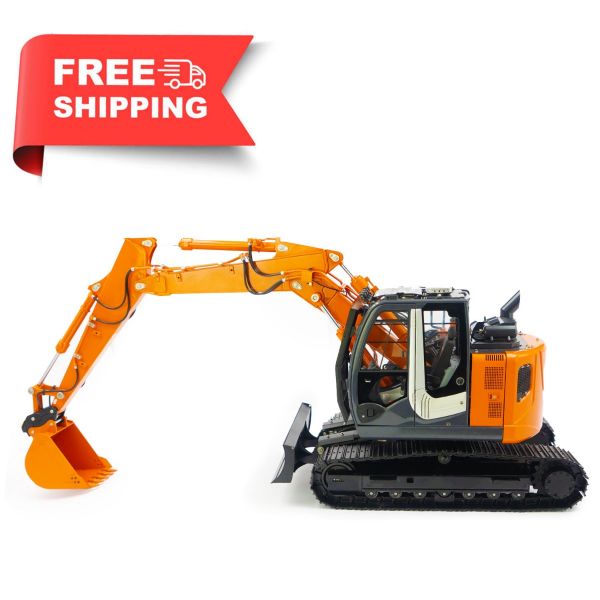Recognizing Exactly How Excavator Functions and Its Impact on Effectiveness
Excavators play a vital role in building and mining procedures, relying upon a complex interaction of mechanical and hydraulic systems. Their ability to perform a variety of tasks pivots on both their design and the technology integrated within. Understanding these components can considerably affect functional effectiveness and productivity. As advancements proceed to reshape the sector, one need to consider just how these modifications will affect future techniques and performance.
The Essentials of Excavator Mechanics

The Duty of Hydraulic Equipments in Excavators
At the heart of excavator procedure exists the hydraulic system, which plays an essential duty in powering the machine's motions and functions. This system makes use of pressurized hydraulic fluid to transfer power, enabling different activities such as lifting, moving, and digging. By utilizing the concepts of hydraulics, excavators can perform jobs with amazing precision and pressure, boosting general functional efficiency.The hydraulic system includes essential elements, consisting of valves, pumps, and cylinders, which interact to regulate the flow and instructions of the liquid. When the driver engages the controls, the hydraulic liquid is guided to specific cyndrical tubes, translating the operator's commands into physical movement. This device permits for smooth and receptive actions, which are vital in building and excavation atmospheres. double e volvo rc excavator. The effectiveness of the hydraulic system directly impacts the performance and adaptability of the excavator, making it a crucial component in modern excavation processes
Trick Elements of an Excavator
Comprehending the vital parts of an excavator is essential for comprehending how this effective device runs. An excavator consists of a number of considerable elements, consisting of the undercarriage, residence, container, arm, and boom. The undercarriage gives security and flexibility, typically including tracks or wheels to browse different surfaces. Your home has the engine and hydraulic systems, allowing the operator to regulate movement and power the machine. The boom expands from your house, making it possible for vertical reach, while the arm links to the pail, helping with digging and training operations.Additionally, the cab houses the driver, equipped with controls for exact maneuvering. Each of these elements plays an important function in the excavator's overall capability, adding to its efficiency and effectiveness on building and construction sites. Recognizing these parts aids in enhancing and keeping excavator performance, guaranteeing jobs are finished securely and successfully.
Attachment Flexibility and Its Benefits
Attachment flexibility is a crucial aspect of excavators, allowing drivers to switch over between different tools tailored for particular tasks. This adaptability not only enhances work effectiveness but also contributes to cost-effectiveness by reducing the need for several makers. Recognizing the different sorts of accessories readily available can significantly influence the general efficiency and capability of an excavator on work websites.
Kinds of Add-ons
While excavators are primarily recognized for their digging capabilities, their true convenience depends on the wide array of attachments readily available. These accessories improve the excavator's functionality, permitting it to do numerous tasks past excavation. Typical attachments consist of containers (for digging and scooping), hydraulic thumbs (for understanding materials), and augers (for piercing holes) Grapples are made use of for relocating and dealing with particles, while rippers can separate hard surface areas. Various other specialized add-ons, such as plates and plows, allow excavators to adapt to certain task requirements. This variety not just increases the maker's utility throughout different fields, including landscape design, construction, and demolition, yet also enables operators to tailor their equipment to satisfy certain task demands successfully.
Raised Job Performance
Making best use of task performance is a key advantage of making use of different excavator add-ons. Different add-ons enable an excavator to carry out numerous tasks without requiring to switch tools, saving useful time and labor. Using a hydraulic hammer can damage concrete while a bucket attachment can excavate dirt, enabling a seamless process. This convenience lowers downtime connected with tools adjustments and enhances efficiency on-site. Furthermore, specialized add-ons enhance precision in tasks such as grading or landscape design, leading to higher high quality end results. The ability to adapt to different task demands not just improves operations however likewise decreases the need for extra machinery, guaranteeing that jobs are finished promptly and successfully. In general, add-on convenience substantially adds to enhanced job efficiency in excavation job.
Cost-Effectiveness and Convenience
Cost-effectiveness is a considerable benefit of using flexible excavator add-ons. These add-ons enable a solitary excavator to do several tasks, minimizing the requirement for additional machinery and labor - double e volvo rc excavator. By switching between pails, hammers, and grapples, operators can take on numerous jobs, from digging to demolition, thus maximizing equipment application. This adaptability not only lowers operational expenses but likewise minimizes downtime related to transforming equipment. In addition, the ability to personalize excavators with specialized attachments boosts efficiency, as they can efficiently take care of diverse tasks according to task demands. To end, the combination of cost-effectiveness and versatility in excavator add-ons contributes to improved functional efficiency and source allocation in construction and excavation tasks

Advanced Innovation in Modern Excavators
Modern excavators are significantly furnished with sophisticated technology that transforms excavation procedures. Automation improves procedures, while boosted gas efficiency lowers functional costs. Additionally, wise control systems enhance precision and safety and security, noting a considerable evolution in excavation tools.
Automation in Excavation Processes
As excavation technology progresses, automation has actually become a vital element in boosting performance and precision on task websites. Modern excavators are furnished with advanced automated systems that promote tasks such as grading, excavating, and trenching with very little driver treatment. These systems make use of sensors, GPS, and artificial intelligence algorithms to assure precise positioning and deepness control, greatly minimizing the margin for error. Furthermore, automation permits operators to focus on critical decision-making as opposed to hand-operated controls, resulting in enhanced performance in general. Such advancements not just enhance process but likewise enhance security by decreasing human error in complex operations. As a result, the integration of automation in excavation processes stands for a considerable innovation in building and construction modern technology, driving the industry towards greater efficiency and performance.
Improved Gas Effectiveness
Developments in modern technology have actually additionally brought about considerable renovations in fuel performance for contemporary excavators. Modern equipments are geared up with sophisticated engines that enhance power outcome while decreasing fuel usage. These engines utilize innovative burning innovations, such as turbocharging and direct fuel injection, to boost performance and performance. Furthermore, lightweight products in construction lower total weight, permitting less power expenditure during operation. The introduction of variable rate controls allows drivers to adjust engine performance according to specific jobs, better decreasing fuel use. Therefore, these enhancements not just lower visit their website operational expenses but also add to ecological sustainability by reducing discharges. In general, boosted gas efficiency in excavators is an important advancement that strengthens efficiency and economic practicality in the construction industry.
Smart Control Solution
While operators navigate increasingly complicated work sites, wise control systems in excavators have arised as important tools for enhancing performance and precision. These innovative innovations make use of sensors and formulas to keep track of numerous parameters such as lots weight, terrain problems, and functional performance. By immediately adjusting hydraulic features, clever systems optimize device efficiency, resulting in boosted productivity and minimized endure parts. Additionally, drivers benefit from intuitive interfaces that supply real-time responses and diagnostics, permitting notified decision-making. This assimilation of modern technology not only enhances procedures however likewise decreases human mistake, adding to safer workplace. As the building and construction sector continues to develop, wise control systems will certainly play an essential role in shaping the future of excavator efficiency and efficiency.
Enhancing Functional Performance With Excavators
Excavators play an essential role in enhancing functional performance across numerous construction and excavation jobs. here Their convenience enables for several tasks, including product, training, and excavating handling, which streamlines operations and lowers the demand for added devices. With powerful hydraulic systems, excavators can execute heavy-duty jobs with precision, significantly decreasing the moment needed to full tasks. The integration of innovative modern technology, such as general practitioner and automated controls, even more optimizes their procedure, making it possible for drivers to accomplish higher accuracy and lower product waste. Furthermore, modern excavators are made to eat less gas and lessen emissions, adding to both price financial savings and ecological sustainability. By making use of excavators efficiently, construction groups can boost productivity, meet job target dates, and boost general site administration. This multifunctionality and performance make excavators indispensable tools in the contemporary construction landscape.
The Future of Excavators in Construction and Mining Industries
As the building and mining sectors advance, the future of excavators is positioned for significant improvement driven by technological development and transforming operational needs. Advancements in automation and expert system are reshaping excavator capacities, permitting improved accuracy and performance in operations. Self-governing excavators are emerging, minimizing the demand for human intervention and lessening the threat of accidents.Moreover, the integration of telematics and IoT innovation makes it possible for real-time monitoring of device efficiency and anticipating upkeep, optimizing uptime. Green designs, including electric and hybrid versions, are acquiring grip, aligning with sustainability goals within the industry.Additionally, the usage of advanced products and lighter designs boosts fuel effectiveness while maintaining efficiency requirements. As these fads development, excavators will play an essential function in fulfilling the raising demands for performance and safety in building and construction and mining, inevitably transforming operational landscapes.
Frequently Asked Questions
Exactly How Do Climate Problems Influence Excavator Efficiency?

Weather substantially affect excavator efficiency, as rainfall and mud can impede traction and security, while extreme temperature levels might impact hydraulic systems. Operators must adjust to these click here for more info variables to guarantee excellent functionality and safety throughout operations.
What Precaution Should Operators Comply With While Using Excavators?
Precaution for excavator operators consist of using ideal personal safety equipment, performing pre-operation evaluations, making certain appropriate interaction with ground personnel, keeping a safe range from overhanging risks, and sticking to recognized functional protocols to avoid accidents.
Exactly How Often Should Excavators Be Maintained for Ideal Efficiency?
Excavators must be maintained on a regular basis to guarantee peak performance, normally every 250 operating hours or as defined by the producer. Routine checks improve reliability, avoid unexpected break downs, and prolong the life-span of the tools.
What Is the Average Lifespan of an Excavator?
The typical life expectancy of an excavator commonly ranges from 10,000 to 15,000 hours of procedure. Variables affecting long life consist of upkeep methods, operating conditions, and the high quality of the machine itself, influencing total performance and efficiency.

Can Excavators Run on Irregular Terrain Efficiently?
Excavators can run properly on irregular terrain due to their verbalized styles and flexible tracks. These attributes permit them to keep stability and traction, enabling effective procedure in tough environments commonly experienced in building and landscaping jobs. Each of these elements plays a crucial function in the excavator's general performance, contributing to its effectiveness and performance on construction sites. Making best use of work effectiveness is a main benefit of using various excavator add-ons. While operators browse progressively intricate job sites, smart control systems in excavators have actually emerged as crucial devices for improving efficiency and accuracy. Excavators play a vital duty in boosting functional effectiveness throughout various building and excavation projects. Developments in automation and fabricated knowledge are reshaping excavator capacities, enabling for enhanced accuracy and performance in procedures.